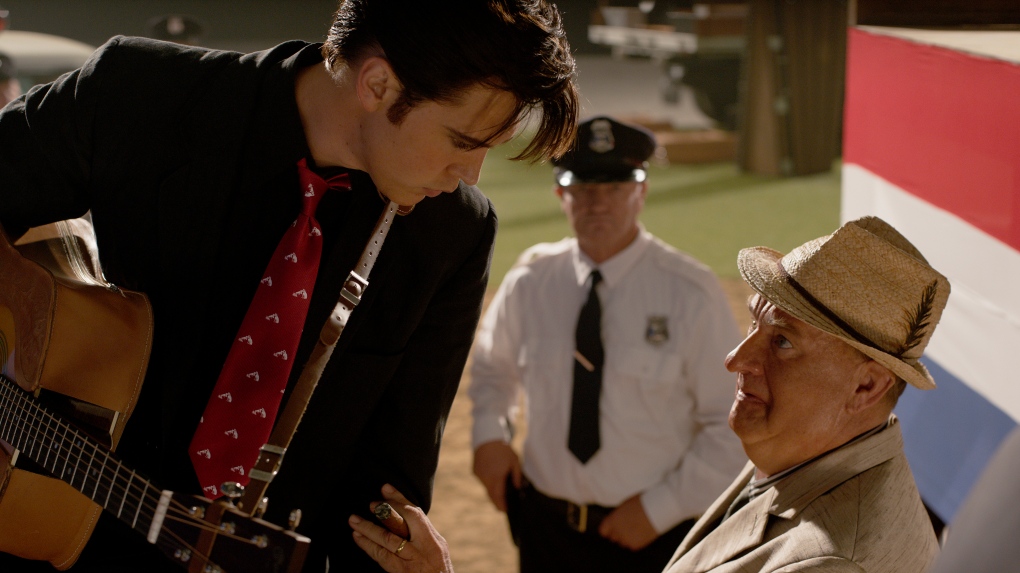ELVIS: 3 ½ STARS
 This image released by Warner Bros. Pictures shows Austin Butler and Tom Hanks in a scene from "Elvis." (Warner Bros. Pictures via AP)
This image released by Warner Bros. Pictures shows Austin Butler and Tom Hanks in a scene from "Elvis." (Warner Bros. Pictures via AP)
“Elvis,” the new King of Rock 'n' Roll biopic from maximalist director Baz Luhrmann, begins with a sparkling, bedazzled Warner Bros logo and gets flashier and gaudier from there.
The movie is told from the point of view of Elvis’ (Austin Butler) manager, Colonel Tom Parker (Tom Hanks under an inch or two of makeup), a huckster with a flair for spotting talent and a gift for manipulation.
Working on the carnival circuit taught Parker that a great act “gave the audience feelings they weren’t sure if they should enjoy,” a standard the early, hip-shaking Elvis met and exceeded.
Their partnership is one of the best known and well documented success stories of the 20th century. For twenty years, through the birth of rock 'n' roll of the late 1950s and the cheesy Hollywood years, to the legendary 1968 comeback special and the Las Vegas rise and fall, Elvis and the Colonel shimmied and shook their way to the top of the charts and into the history books.
“Elvis” covers a lot of ground. From young Elvis (Chaydon Jay) discovering his love of music in the Black rhythm and blues artists and Mississippi church music he absorbed as a kid, to his final white jumpsuit days in Vegas, Luhrmann shakes, rattles and rolls throughout in a blur of images and spectacular sound design.
It entertains the eye, but feels akin to skipping a stone on a lake. If you hold the stone just right and throw it across the still water at the correct angle, it will skim along for what seems like forever without ever piercing the surface.
“Elvis” is a great looking movie. A pop art explosion that vividly essays the story’s various time frames and styles; it makes an impact visually and sonically. Unfortunately, Luhrmann is content to make your eyeballs dance, your gold TCB chains rattle, and simply skim across the surface.
We do learn that Elvis was the sum of his country music and R&B experiences and influences, was fuelled by the adoration of his audience, and aware of the social change of the 1960s, but there is no excavation, no real exploration of what made the singer or his manager actually tick. It may seem fitting that a movie about a man who drove pink Cadillacs and wore phoenix embroidered jumpsuits and capes is over-the-top, but those images are so woven into the fabric of popular culture already that this feels clichéd, more like a greatest hits album than a biography.
Butler is a charismatic performer, playing Elvis through several stages of his life and, despite the superficiality of the storytelling, hands in a rounded performance that transcends an impersonation of a man who spawned a generation (or two) of impersonators.
It’s rare to see Hanks play a character with no redeeming qualities. “I am the man who gave the world Elvis Presley,” he says. "And yet there are some who would make me out to be the villain of this story.” His take on Colonel Parker grates, with the theatrical Dutch accent and imperious, manipulative manner, he is certainly the villain of the piece. He’s a pantomime of the big, bad music manager, one who saw his client as a musical ATM machine and little more.
By the time the end credits roll, “Elvis” emerges as an idealized look at the boy from Tupelo who became the King by paying tribute to the power of the music that made him a legend.
 This image released by Universal Pictures shows Ethan Hawke, left, and Mason Thames in a scene from "The Black Phone." (Universal Pictures via AP)
This image released by Universal Pictures shows Ethan Hawke, left, and Mason Thames in a scene from "The Black Phone." (Universal Pictures via AP)
THE BLACK PHONE: 4 STARS
Ethan Hawke appears to have entered the bad guy phase of his movie career. After a popular turn as religious zealot and cult leader Arthur Harrow on Disney+’s “Moon Knight,” he returns to haunt your dreams as a masked serial killer nicknamed The Grabber in “The Black Phone,” now playing in theatres.
Adapted from a short story of the same name by acclaimed author, and Stephen King’s son, Joe Hill, and set in 1978, “The Black Phone” centres on shy baseball pitcher Finney (Mason Thames, who resembles a teen Patrick Swayze).
Bullied at school and ostracized by his classmates, things aren’t much better at home where his abusive, alcoholic father (Jeremy Davies) doesn’t seem to have a clue how to be a parent to him or his potty-mouthed sister Gwen (Madeleine McGraw).
In town, kids are disappearing, lured away by The Grabber, a serial killer who approaches his prey dressed as a macabre children’s entertainer and a question: “Wanna see a magic trick?”
Finney becomes the sixth victim when The Grabber knocks him unconscious and whisks the boy away to a soundproof basement with an antique black phone on the wall. Although disconnected, Finney soon discovers he can communicate with The Grabber’s previous victims on the phone. In the dungeon the voices of the dead attempt to help him escape, while sister Gwen looks for clues in a series of very vivid psychic dreams. “Please, please,” she says. “Let the dreams be true.”
“The Black Phone” is an intense, efficiently told horror story of captivity, dread and friendship. Finney spends most of the film trapped in The Grabber’s basement, relying on ingenuity, a little help from some otherworldly entities and an untapped reserve of courage to survive.
The creepy, supernatural element aside, it’s the real-life terror of the very earthbound Grabber that shocks. With no motive other than satisfying his own twisted desires, he is the specter of mindless malevolence. Hawke, performing through a mask for 99.9% of the film, projects pure evil. Most of his dialogue might sound almost innocent on the page, but add a high-pitched affectation and expert delivery, and a line like, “I will never make you do anything you won’t like,” becomes, “I will never make you do anything you won’t… like.” That pause is where the menace is, and Hawke plays those goose-bump raising moments beautifully.
Thames hands in an authentic and resource performance, but it is McGraw as the firebrand Gwen who steals the show. She wouldn’t have been out of place in any number of 80s Amblin flicks. She's resilient, has a way with a cuss word and brings the heart and soul to her dysfunctional family unit.
Director Scott Derrickson faithfully recreates an inviting 1970s backdrop, painted with a mix of teen concerns, like bullies and the cute girl in lab class, edged with a darker, more violent hue. It may have been a simpler time, but Derrickson isn’t all about nostalgia. You might still get beaten up on the way home from school, or worse. It feels authentic, and when the real horror enters the picture, it hits hard.
“The Black Phone” is an unsettling horror thriller that doesn’t rely on gore, just heaps of tension, suspense, atmospherics and fright that doesn’t rely on a supernatural to terrify.
SLASH/BACK: 3 STARS
 A scene from the film 'Slash/Back.' (Photo courtesy SXSW)
A scene from the film 'Slash/Back.' (Photo courtesy SXSW)
Most horror movies take place in the dark, but the spunky, microbudgeted “Slash/Back,” a new coming-of-age alien invasion movie now playing in theatres, is unique. Set in Pangnirtung, a remote fishing community in Nunavut, the action happens under the relentless glare of 24-hour summer solstice sunlight.
The main action kicks off as the rebellious Maika (Tasiana Shirley) and friends, Jesse (Alexis Vincent-Wolfe), Leena (Chelsea Pruksy) and Uki (Nalajoss Ellsworth), hijack a boat and set off to explore some local, sun dappled scenery. Instead of the beauty of nature, they are confronted by a polar bear, but not just any polar bear. Big and bloodthirsty, it attacks Maika’s younger sister Aju (Frankie Vincent-Wilfe) before Uki takes a shot at the beast, scaring it off, but not before it sprouts eel-like tentacles.
The friends quickly assume the polar bear was actually a shape shifting Ijiraq, an evil creature of folklore, who can appear in many different forms. Or is it an alien? Or both?
Whatever it is, it’s bad.
To protect their community, the friends take up ulu knives, machetes and even the odd hockey stick, combined with innate courage, a deep understanding of horror films and traditional knowledge gleaned from Maika’s father, who used to be the town’s greatest hunter, to save the people and place they love. “Nobody f**** with the girls from Pang,” is their battle cry.
“Slash/Back” evokes memories of “Attack the Block,” “Invasion of the Body Snatchers” and “The Thing,” with a dash of ”Super Eight” for good measure, and yet manages to do something unique. It works as a coming-of-age story with sci-fi overtones, but it’s the characters and the location that sets it apart. Mixing an exploration of Indigenous identity and culture with badass kids summoning all their ability to protect their community deepens the story, adding layers of subtext to a familiar-ish action story.
The cast brings more charm than acting chops, but each character brings something special. From Maika’s “No Justice on Stolen Land” slogan splashed across the back of her leather jacket, to the quiet and lovelorn Jesse, the characters are easy to root for and, above all, authentic.
Director Nyla Innuksuk’s “Slash/Back” is a clever, lo-fi genre movie that is equal parts social commentary, charm and scares.

Post a Comment